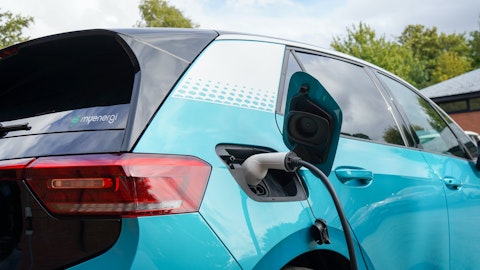In this article, we will discuss 10 EV stocks that will benefit from the Climate Change Bill 2022. If you want to skip reading about the details of the bill, go directly to 5 EV Stocks that Will Benefit from Climate Change Bill 2022.
On August 7, the U.S. Senate approved a comprehensive $430 billion bill to combat climate change, decrease drug prices, and increase a few corporate taxes. The bill, also known as the Inflation Reduction Act, would provide electric car buyers tax credit. Presently, taxpayers were given a tax credit of $7,500 on buying an EV, and there was a limit of giving tax credits to 200,000 customers for each EV manufacturer. Under the new bill, this limit has been eliminated, and the tax credit has been extended till 2032. Furthermore, the government also announced a tax credit of $4,000 on used EVs, which are priced at $25,000 or less. To become eligible for the tax credit for a used vehicle, the gross annual income for a family should be $150,000 or lower.
The bill requires that the EV is manufactured in North America, and the critical raw materials and other components should be either sourced from the US or a nation that has a free-trade agreement with the US. This would mean that some EVs that are sold in the US but do not fulfill these requirements would be ineligible for the tax credit when the law comes into effect from January 2023. The new tax credit would be applicable on trucks, sports utility vehicles (SUVs), and vans under the price of $80,000 and cars up to $55,000. Furthermore, the tax credit on new EVs would only be granted to families that have a gross annual income of $300,000 or under. The US government also gave $3 billion to the US Postal Service to acquire EVs and equipment related to battery charging.
The US government is promoting EVs to combat climate and environmental deterioration. According to the Environment Protection Agency (EPA), conventionally powered fuel engines are responsible for contributing 27% of the greenhouse gas emissions in the US. In comparison, battery-powered cars only produce a fraction of greenhouse gases like carbon dioxide. However, EVs have not become as economical as fuel-powered vehicles because critical raw materials like lithium have observed a significant increase in prices due to high demand and limited supply. According to Irvine, California-based automobile research and valuation firm Kelly Blue Book, the average price of EVs has risen by 14% YoY to $66,000, which is $20,000 higher than the average price for all new cars. The demand for EVs is strong, and companies are either not taking fresh orders due to the significant backlog of orders or giving a delivery date from January 2023 to April 2023. Some of the most popular players in the EV industry include Tesla, Inc. (NASDAQ:TSLA), General Motors Company (NYSE:GM), and Rivian Automotive, Inc. (NASDAQ:RIVN).
Our Methodology
Given the favorable outlook for the EV industry following the Climate Change Bill, we will go through the 10 EV stocks that will benefit from the bill. We will look into how these companies will capitalize on the developments discussed above. Insider Monkey’s database of 912 hedge funds was used to derive the hedge fund sentiment concerning each stock as of Q1 2022.
10 EV Stocks that Will Benefit from Climate Change Bill 2022
10. Toyota Motor Corporation (NYSE:TM)
Number of Hedge Fund Holders: 9
Toyota Motor Corporation (NYSE:TM) is a Japanese automobile manufacturer. Toyota Motor Corporation (NYSE:TM) would benefit from the removal of the limit over granting tax credits as it had recently used up its quota of giving tax credits to 200,000 customers. However, Toyota Motor Corporation (NYSE:TM) would need to modify the production of bZ4x and Mirai variants to make them eligible for the tax credit. Under the requirements of the bill, both these vehicles will not be eligible because they are not manufactured in North America.
Hence, Toyota Motor Corporation (NYSE:TM) is preparing to boost its EV production in the US. The company reached a new supply agreement to procure 4,000 tonnes of lithium carbonate annually from the Rhyolite Ridge mining project owned and operated by Ioneer Limited. The lithium will be enough to produce around 150,000 EVs annually. Toyota Motor Corporation (NYSE:TM) anticipates achieving annual EV sales of 3.5 million by 2030. The company sold 1.6 million EVs globally in 2021.
Baron Funds shared its thoughts on Toyota Motor Corporation (NYSE:TM) in its Q1 2022 investor letter. Here’s what the firm said:
“Toyota’s (NYSE:TM) “kaizen” manufacturing philosophy is based on improving manufacturing by using “just in time” processes to eliminate waste and reduce inventory carrying costs. Clearly the company does not contemplates disruptive change that will dramatically lower costs and improve quality.”
9. Fisker Inc. (NYSE:FSR)
Number of Hedge Fund Holders: 16
Fisker Inc. (NYSE:FSR) is a Manhattan Beach, California-based EV company.
Fisker Inc. (NYSE:FSR) intends to use the “Transition Rule” of the Climate Change Bill and get reservations for the company’s all-electric SUV Fisker Ocean by entering into a binding contract with the customers. Instead of receiving the full amount upfront, Fisker Inc. (NYSE:FSR) is converting $100 and $250 deposits into non-refundable orders in their systems. The Fisker Ocean is priced at $37,499, excluding tax credit. After incorporating the impact of the credit, the price of $30,000 becomes very attractive. The pricing sets Fisker Inc. (NYSE:FSR) apart from its competitors.
However, it should be noted that Fisker Ocean would not be eligible for the complete incentives proposed by the bill because its manufacturing will start in November 2022 through a third-party Magna plant in Graz, Austria. The US does not have a free trade agreement with Austria.
Citadel Investment Group increased its stake in Fisker Inc. (NYSE:FSR) by 45% during Q1 2022.
8. ChargePoint Holdings, Inc. (NYSE:CHPT)
Number of Hedge Fund Holders: 16
ChargePoint Holdings, Inc. (NYSE:CHPT) is a Campbell, California-based developer of EV charging stations across North America and Europe.
ChargePoint Holdings, Inc. (NYSE:CHPT) will benefit from the higher sales of EVs and a higher level of support from the government following the imposition of the bill. Charging companies have been finding it challenging to keep up with the demand for new charging stations as the adoption of EVs is growing rapidly.
ChargePoint Holdings, Inc. (NYSE:CHPT) has entered into a partnership with Starbucks Corporation (NASDAQ:SBUX) and Volvo Cars to provide its charging facilities at Starbucks stores along the 1,350-mile Denver to Seattle route. Four charging stations have been installed at the first Starbucks location in Provo, Utah, and additional locations will be picked for the installation of charging stations moving forward. ChargePoint Holdings, Inc. (NYSE:CHPT) also received a boost earlier this year when the US government announced in February that it would give $5 billion to states to fund the construction of EV chargers.
Overall, 16 funds held a stake worth $34.7 million in ChargePoint Holdings, Inc. (NYSE:CHPT) as of Q1 2022.
7. Lucid Group, Inc. (NASDAQ:LCID)
Number of Hedge Fund Holders: 16
Lucid Group, Inc. (NASDAQ:LCID) is a Newark, California-based luxury EV startup that is backed by Saudi Arabia’s Public Investment Fund (PIF).
The company’s Lucid Air will be ineligible for the tax credit as the starting price of the EV car is $107,400, significantly higher than the price limit set to qualify for the credit. However, Lucid Group, Inc. (NASDAQ:LCID) has the benefit of having its production facility located in Case Grande, Arizona, which makes the company’s offerings eligible for the tax credit. Lucid Group, Inc. (NASDAQ:LCID) is expected to develop a variant that falls in the required price range.
Lucid Group, Inc. (NASDAQ:LCID) is already working on expanding the production capability at its Case Grande facility under Phase-3 to 400,000 units annually. This will be a big jump as the company only delivered 1,379 vehicles during the first half of 2022 and intends to achieve an output of 6,000 to 7,000 units by the end of 2022.
The number of hedge funds having a stake in Lucid Group, Inc. (NASDAQ:LCID) increased from 14 in Q4 2021 to 16 in the second quarter of 2022.
6. Canoo Inc. (NASDAQ:GOEV)
Number of Hedge Fund Holders: 19
Canoo Inc. (NASDAQ:GOEV) is a Torrance, California-based EV startup in the pre-revenue stage.
During the Q2 2022 results, Canoo Inc. (NASDAQ:GOEV) revealed that it finished the second quarter of the year with over $1 billion in the company’s sales pipeline. This was primarily due to the 4,500 units order placed by Walmart, Inc. (NYSE:WMT), which can potentially rise to 14,500 units. Canoo Inc. (NASDAQ:GOEV) has also reached an agreement with the US Army to provide its EV for analysis and demonstration. This could also lead to a possible bulk order in the near future.
Canoo Inc. (NASDAQ:GOEV) is expanding its operations and intends to launch an Electric Pickup Truck in 2023 that is expected to be priced around $35,000 to $50,000. The truck can be pre-ordered through the company website for a refundable fee of $100. As Canoo Inc. (NASDAQ:GOEV) expands its production, the company will become a beneficiary of the Climate Change Bill as most of its products will be within the price range required to be eligible for the tax credit.
At the end of Q1 2022, 19 funds reported owning a stake in Canoo Inc. (NASDAQ:GOEV).
Besides Canoo Inc. (NASDAQ:GOEV), popular companies like Tesla, Inc. (NASDAQ:TSLA), General Motors Company (NYSE:GM), and Rivian Automotive, Inc. (NASDAQ:RIVN) are also expected to benefit from Climate Change Bill 2022.
Click to continue reading and see 5 EV Stocks that Will Benefit from Climate Change Bill 2022.
Suggested Articles:
- Top 8 Stock Picks of Jeff Ubben’s Inclusive Capital
- 10 Best Stocks For Inflation According to Redditors
- 10 Healthcare Stocks to Buy Now According to Billionaire Larry Robbins
Disclose. None. 10 EV Stocks that Will Benefit from Climate Change Bill 2022 is originally published on Insider Monkey.






